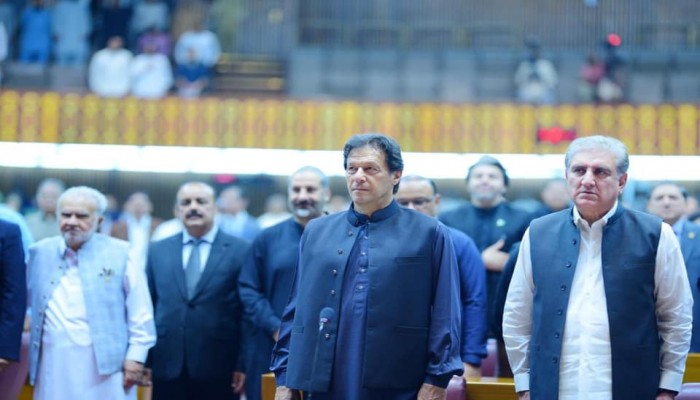Should India be concerned about Pakistan-Israel formal ties?
- In Foreign Policy
- 10:02 AM, Sep 16, 2019
- Ramaharitha Pusarla
Since August 5th Pakistan has been trying every possible trick to internationalise revocation of special status to Kashmir an “internal matter” of India. It marshalled diplomatic corps, pro-Pakistan media agencies, the Diaspora to internationalise the issue and gave a free hand to its strategic assets to stir insurgency in the Kashmir valley. Pakistani leaders gave calls for jihad openly. But all its insidious attempts earned it isolation, embarrassment and censure. Needless to say, Pakistan is losing international credibility. Confirming this view, Pakistani interior Minister Brigadier Ijaz Ahmed Shah in an interview admitted, “The World believes India, not Pakistan”.
After the international alienation and a muted response from Arab World, Pakistan sought to revamp its foreign policy. Pakistani military establishment which keeps a tight leash on its media allowed journalists to discuss the possibilities of establishing diplomatic ties with Israel. Giving voice to the speculations of changes in foreign policy, an influential Pakistani journalist Kamran Khan on Aug 25th tweeted, “High time Pakistan counters nefarious Indian designs with bold foreign policy moves. Our deepest friends making fresh alignments. No permanent friends no enemies. Why can’t we openly debate pros cons of opening direct and overt channels of communication with the state of Israel”. As anticipated the tweet triggered a debate on social media. The message has been an attempt to reshape the opinion of Pakistani public who were fed with generous doses of anti-Semitism. In fact, Pakistani mosques regularly hold sermons and prayers calling for destruction of Israel.
Paradigm shift in Islamabad’s diplomacy has in reckoning for some time. Last year October, there was a buzz about an Israeli flight landing in Islamabad. Pakistan quickly dismissed this report and rejected any plans of secret talks between both countries. The event came to light after an Israeli journalist tweeted about emergency landing of an Israeli flight traveling enroute Amman to Islamabad. Around the same time, Pakistan’s lone Jew urged government to permit him to travel to Jerusalem on pilgrimage. Pakistani passport holders can travel to any country without any hitch but disallowed to visit Israel. Interestingly, by January 2019, Pakistan government granted him permission to visit Jerusalem. This clearly reflected Pakistan’s softening of stance towards Israel. The gradual levitation of the Muslim World towards Israel in recent times together with stable diplomatic relations established by Egypt and Jordan promoted Pakistan to recalibrate its Israeli policy. Besides, India’s precise surgical airstrikes on Balakot terror camps with the Israeli Spice-2000 bombs triggered Islamabad’s interest in Israel who believed, “(Modi) Hindutva Zionists are the attack dogs but their real handlers sit in Tel Aviv”.
Since its inception, Pakistan considered formal diplomatic ties with Israel a taboo. Also unstinted support to Palestine and remained sympathetic to its movement. This came in the way of cultivating ties with the Jewish state. Islamabad never lost an opportunity drawing parallels between India and Israel and portraying them as aggressors occupying territories. While Pakistan and Israel stand as tall examples of nation states carved out of religious nationalism, Pakistan opposed Israel at UNGA in October 1947. In sharp contrast, Israeli Prime Minister David Ben Gurion sent a telegram to Mohammed Ali Jinnah after Declaration of Independence. But Pakistan didn’t respond. Pakistan backed OIC (Organisation of Islamic Cooperation) formed in 1969 that opposed Israel and in the Arab-Israeli wars in 1967 and 1973.
At times Pakistan took balancing position towards Israel. In 1979 when Egypt was expelled from OIC for its diplomatic relations with Israel, Pakistan facilitated its re-admission into the group. Reportedly, in 1980s Pakistan’s Inter State Intelligence (ISI) and Israeli Intelligence Agency Mossad worked together in CIA led-operations against the Soviet Union in Afghanistan. Paradoxically, while it encouraged people to join Palestine Liberation Organisation (PLO) to fight against Israel, it asked PLO to recognise Israel in 1986. Post Oslo Accord when Israel pulled out of Gaza strip in 1993, it is believed that Pakistan mulled establishing ties with Israel. Pakistan’s realistic approach on Israel was spurred by India’s decision of establishing official ties with Jerusalem in 1992.
Pakistan which is a bunch of contradictions shifted its positions constantly. In 1994, Pakistani Prime Minister Benazir Bhutto reportedly cancelled her visit to Gaza to avoid any coordination with Israeli officials. While officials confirm that Pakistani and Israeli officials held secret talks earlier, it was only in 2003 President Pervez Musharraf openly advocated for diplomatic talks with Israel. In 2005 for the first time Pakistani Foreign Minister Khursheed Kasuri shook hands with his Israeli counterpart Silvan Shalom at Ankara. But this breakthrough failed to produce a thaw in the traditional hostility of Pakistan. Islamists who wield political clout opposed Pakistan’s foreign policy towards Israel. Military establishment steeped in Islamic culture was against opening up official communication with Israel. Successors of Musharraf, puny puppets of the establishment had no stomach for recalibrating Pakistan’s Israeli policy.
Pakistan’s rejuvenated interest in Israel stems from the latter’s increased acceptance and waning of global interest in Palestine. For all its discrepancies International community embroiled with other disputes gave cold shoulder to Palestine movement. Burgeoning hostilities between the Sunni bloc and Iran brought them even closer to Israel which fights Tehran’s terrorism tooth and nail. UAE, Bahrain, Oman, Saudi Arabia which are seeking cooperation and intelligence sharing to take in Iran are making no secret of their ties with Israel. Last year, Israeli Prime Minister made an official visit to Oman. UAE hosted Israeli officials. Crown Prince in an interview welcomed America’s decision of shifting embassy to Jerusalem. Bahrain’s foreign minister Khalid bin Ahmed al Khalif defended Israeli air strikes against Iran in Syria. Arab elites are warming up to Israel. Central Asian Muslim countries are cultivating ties with Israel. A majority of Latin American countries have forged ties with Israel. Diplomatic ties with Israel are no longer kosher. Recent reports even talk of Saudi plans of setting up embassy in Jerusalem lending more credence to Israeli claims to the historical city. Normalisation of ties with Israel is now order of the day. Above all, India’s growing conventional weapons superiority and the acquisition of advanced technologies denied by the US from Israel serves as a compelling case for Pakistan to open diplomatic channels of communication with Israel.
Pakistan realises the importance of staying in good books of the US to be strategically relevant. By cultivating ties with Israel Pakistan can influence the powerful lobby of US Jews, who tow an anti-Pakistani stand. Pakistan will also stand to gain from military ties with Israel. But given Pakistan’s crippling economic crisis and international reputation of being the “the most dangerous of all the countries” as enunciated by the US former defence secretary Jim Mattis in his new book Call Sign Chaos: Learning to Lead, Pakistan may not be an interesting bet for Israel. While there is perception that ties with Pakistan can be beneficial in dealing with Iran, Islamabad is duplicitous and can’t be trusted. Pakistan adopts a cautions approach towards Iran. In 2015 it turned down Saudi request to join troops in Yemen. Also, both Pakistan and Iran have common interests in Baluchistan and aspire to have an influence in Afghanistan. Pakistan which relies on Iran for concessionary oil may be averse to be on a collision course with its Western neighbour. Pakistan is full of paradoxes. This makes it an untrustworthy friend.
But a recognition by Pakistan will enhance Israel’s legitimacy. Israel will respond positively respond to Pakistan’s overtures. Overt diplomatic communications with any Muslim country big or small can erode religious dissensions. Israel which is keen on normalising ties with all countries might welcome any friendly call.
Islamabad always depicted Israel as an imperialist state. At a time when Pakistan made fight for Kashmir its survival issue getting public acceptance for ties with Israel who supplied weapons to India for Balakot strikes will be a nightmare. In 2002, overriding popular sentiments Pakistani tennis player Aisam-ul-Haq Qureshi partnered with Israeli Amir Hadad at Wimbledon and reached third round. This created a stir in Pakistan which even out blackouts Israel players in Olympics. For decades, Pakistan churned out conspiracy theories about Israel. It will be difficult to overcome Islamic resistance. For all the debated in political circles on formal ties with Israel, the current political dispensation which lacks credibility, astuteness and relevance can hardly muster courage to take any iconic step in that direction. India which enjoys a robust strategic partnership with Israel shouldn’t lose sleep over the current discourse.
- https://www.haaretz.com/israel-news/.premium-pakistan-will-not-be-recognizing-israel-anytime-soon-here-s-why-1.7812946
- https://www.haaretz.com/israel-news/.premium-is-pakistan-preparing-to-recognize-israel-1.7773360
- https://www.haaretz.com/world-news/.premium-israel-would-welcome-ties-with-pakistan-should-india-worry-1.7805334
- https://indianexpress.com/article/opinion/columns/pakistan-israel-imran-khan-kashmir-economy-5980797/
- https://www.middleeastmonitor.com/20190828-next-up-a-saudi-embassy-in-jerusalem/
- https://www.trtworld.com/asia/why-is-everyone-talking-about-pakistan-recognising-israel-29555
- https://www.haaretz.com/1.4940034
Disclaimer: The opinions expressed within this article are the personal opinions of the author. MyIndMakers is not responsible for the accuracy, completeness, suitability, or validity of any information on this article. All information is provided on an as-is basis. The information, facts or opinions appearing in the article do not reflect the views of MyindMakers and it does not assume any responsibility or liability for the same.







Comments